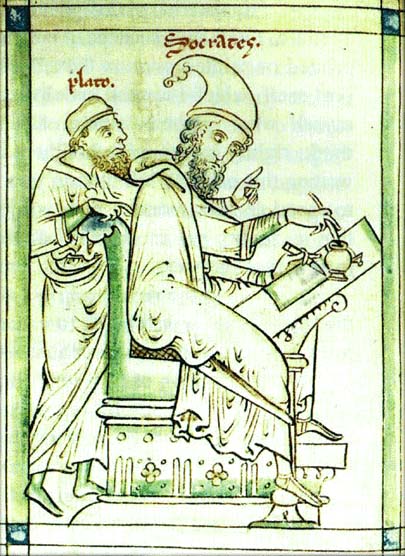 Hailing from Classical Greece of around 2,400 years ago, Plato has given our contemporary world many important intellectual gifts. His broad interests in justice, mathematics, virtue, epistemology, rhetoric and art, laid the foundations for Western philosophy and science. Yet in his quest for deeper and broader knowledge he also had some important things to say about ignorance.
Hailing from Classical Greece of around 2,400 years ago, Plato has given our contemporary world many important intellectual gifts. His broad interests in justice, mathematics, virtue, epistemology, rhetoric and art, laid the foundations for Western philosophy and science. Yet in his quest for deeper and broader knowledge he also had some important things to say about ignorance.
Massimo Pigliucci over at Rationally Speaking gives us his take on Platonic Ignorance. His caution is appropriate: in this age of information overload and extreme politicization it is ever more important for us to realize and acknowledge our own ignorance. Spreading falsehoods and characterizing opinion as fact to others — transferred ignorance — is rightly identified by Plato as a moral failing. In his own words (of course translated), “Ignorance [is] the Root and Stem of All Evil”.
[div class=attrib]From Rationally Speaking:[end-div]
Plato famously maintained that knowledge is “justified true belief,” meaning that to claim the status of knowledge our beliefs (say, that the earth goes around the sun, rather than the other way around) have to be both true (to the extent this can actually be ascertained) and justified (i.e., we ought to be able to explain to others why we hold such beliefs, otherwise we are simply repeating the — possibly true — beliefs of someone else).
It is the “justified” part that is humbling, since a moment’s reflection will show that a large number of things we think we know we actually cannot justify, which means that we are simply trusting someone else’s authority on the matter. (Which is okay, as long as we realize and acknowledge that to be the case.)
I was recently intrigued, however, not by Plato’s well known treatment of knowledge, but by his far less discussed views on the opposite of knowledge: ignorance. The occasion for these reflections was a talk by Katja Maria Vogt of Columbia University, delivered at CUNY’s Graduate Center, where I work. Vogt began by recalling the ancient skeptics’ attitude toward ignorance, as a “conscious positive stand,” meaning that skepticism is founded on one’s realization of his own ignorance. In this sense, of course, Socrates’ contention that he knew nothing becomes neither a self-contradiction (isn’t he saying that he knows that he knows nothing, thereby acknowledging that he knows something?), nor false modesty. Socrates was simply saying that he was aware of having no expertise while at the same time devoting his life to the quest for knowledge.
Vogt was particularly interested in Plato’s concept of “transferred ignorance,” which the ancient philosopher singled out as morally problematic. Transferred ignorance is the case when someone imparts “knowledge” that he is not aware is in fact wrong. Let us say, for instance, that I tell you that vaccines cause autism, and I do so on the basis of my (alleged) knowledge of biology and other pertinent matters, while, in fact, I am no medical researcher and have only vague notions of how vaccines actually work (i.e., imagine my name is Jenny McCarthy).
The problem, for Plato, is that in a sense I would be thinking of myself as smarter than I actually am, which of course carries a feeling of power over others. I wouldn’t simply be mistaken in my beliefs, I would be mistaken in my confidence in those beliefs. It is this willful ignorance (after all, I did not make a serious attempt to learn about biology or medical research) that carries moral implications.
So for Vogt the ancient Greeks distinguished between two types of ignorance: the self-aware, Socratic one (which is actually good) and the self-oblivious one of the overconfident person (which is bad). Need I point out that far too little of the former and too much of the latter permeate current political and social discourse? Of course, I’m sure a historian could easily come up with a plethora of examples of bad ignorance throughout human history, all the way back to the beginning of recorded time, but it does strike me that the increasingly fact-free public discourse on issues varying from economic policies to scientific research has brought Platonic transferred ignorance to never before achieved peaks (or, rather, valleys).
And I suspect that this is precisely because of the lack of appreciation of the moral dimension of transferred or willful ignorance. When politicians or commentators make up “facts” — or disregard actual facts to serve their own ideological agendas — they sometimes seem genuinely convinced that they are doing something good, at the very least for their constituents, and possibly for humanity at large. But how can it be good — in the moral sense — to make false knowledge one’s own, and even to actively spread it to others?
[div class=attrib]Read the entire article after the jump.[end-div]
[div class=attrib]Image: Socrates and Plato in a medieval picture. Courtesy of Wikipedia.[end-div]
